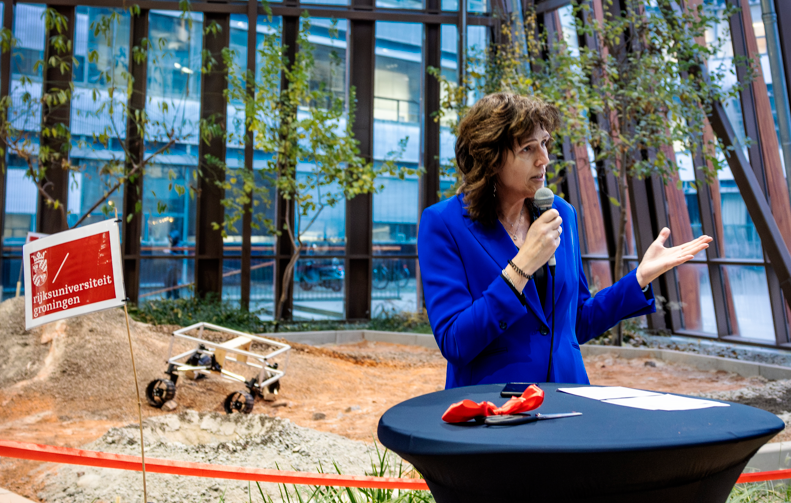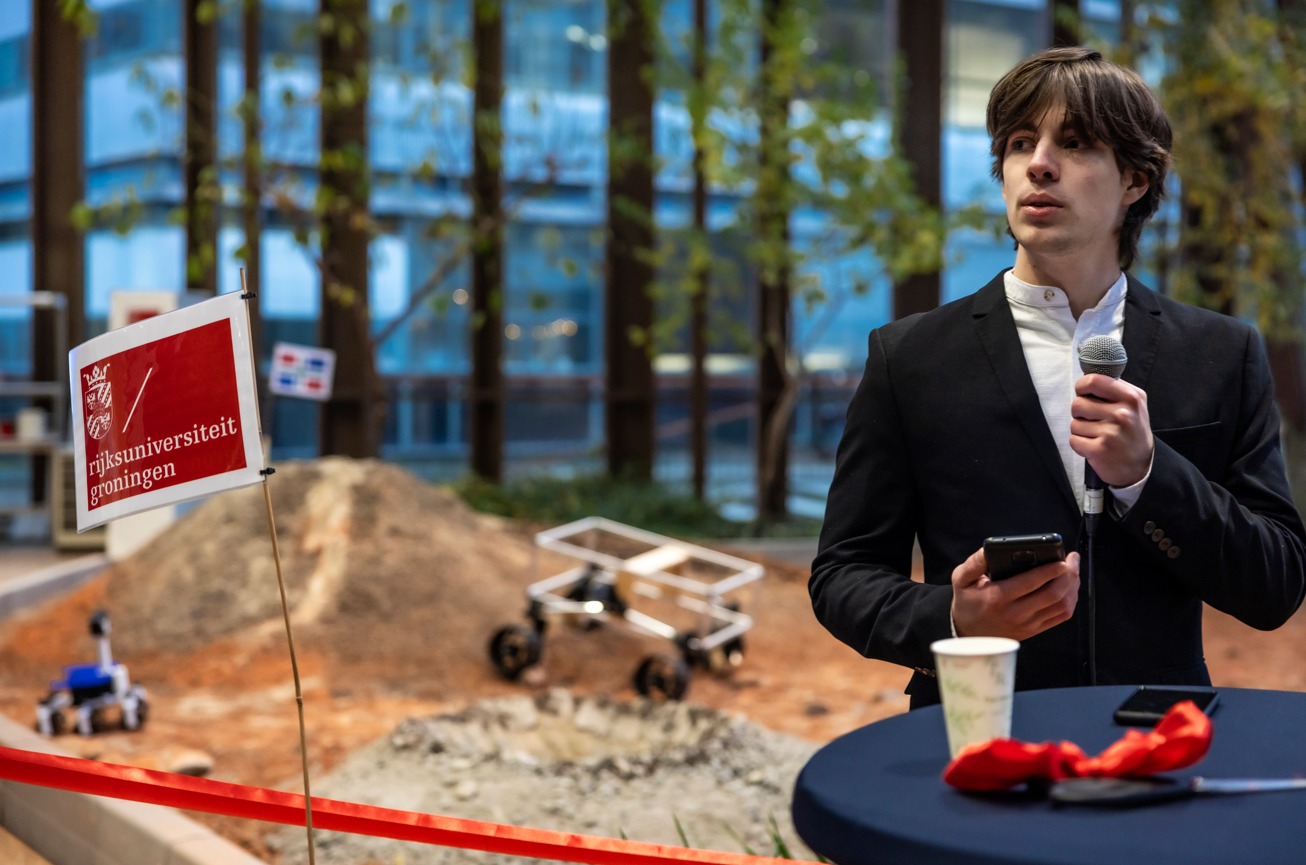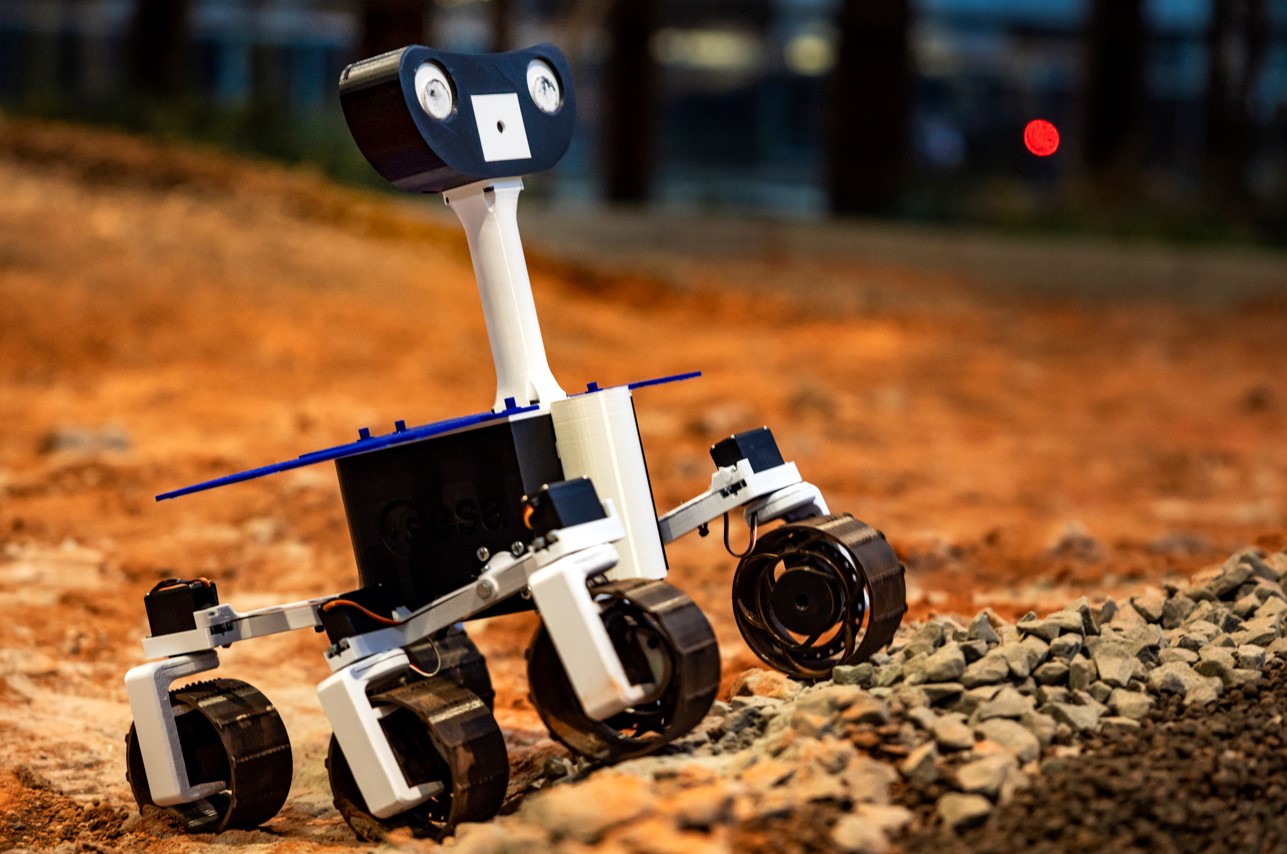RUG-studenten zetten zich op de kaart met zelfgemaakte Mars Yard
Op vrijdag 1 december was het zover, de officiële opening van de Mars Yard. Afgelopen maanden hebben de studenten van het GEARS-team van de RUG hard gewerkt aan de realisatie van het Marslandschap op Zernike. Zij doen aankomend jaar mee aan de fysieke competitie van de zogenaamde ‘European Rover Challenge’ (ERC). Bestuursleden Helena Jaworska en Błażej Rozmarynowicz vertellen meer over de realisatie van de Mars Yard, een belangrijke voorbereiding op de competitie.
Tekst: Froukje Duursema / Foto's: Leoni von Ristok

Het GEARS-team (voorheen Makercie) van de RUG heeft onlangs de eerste plaats behaald binnen de Poolse European Rover Challenge. De ERC wordt sinds 2014 jaarlijks georganiseerd vanuit Kielce in Polen en heeft twee competities: één in Polen zelf en de zogenaamde ‘remote-competitie’ die op afstand plaatsvindt. De bedoeling van de competitie is een op zichzelf staande Marsrover bouwen en deze NASA-geïnspireerde taken laten uitvoeren. GEARS heeft in september vanuit Groningen gewonnen en maakt zich klaar om aankomend jaar deel te nemen aan de fysieke wedstrijd in Kielce.
Inmiddels bestaat het team uit meer dan vijftig leden afkomstig uit negen verschillende landen. Daarnaast representeert ze vijftien studierichtingen, waaronder vooral bacheloropleidingen. GEARS staat voor ‘Groningen Engineering and Robotics Student Association', de eerste studievereniging van de RUG die zich inzet voor techniek en robotica.
Makkelijk is het niet
De Mars Yard zit verstopt in de Wintertuin van de Energy Academy van de RUG. Afgelopen zomer is het team begonnen met de ontwikkeling ervan op Zernike. Het landschap bestaat voor een groot deel uit gravel, maar ook uit vulkanische steen. Iets wat niet direct voorhanden is. Voorzitter Błażej Rozmarynowicz benadrukt dat vooral het verkrijgen van de nodige materialen tegenviel. ‘’Een deel van de materialen is restmateriaal van de constructie van het Feringagebouw op Zernike, waardoor hergebruik mogelijk was. Daarmee hadden we echt geluk. Aan de andere kant moesten we veel importeren, wat de bouw behoorlijk vertraagde’’

Mars Yard als basis voor de competitie
Tijdens de competitie in Polen moet het team vier verschillende taken uitvoeren, namelijk navigatie, onderzoek en sampling, onderhoud en de presentatie. Het Marslandschap vormt de basis voor de meeste van deze taken. Tijdens een van de taken zal de rover bijvoorbeeld samples zoals stenen en zand oppakken via een robotische arm. Om dit te kunnen oefenen is het Marslandschap op Zernike ontwikkeld. De Mars Yard dient zowel als een ontmoetingsplek voor het team en hun activiteiten, als voor evenementen omtrent hun activiteiten. In de zomer van 2024 wordt de rover getransporteerd naar het wedstrijdterrein in Polen, waar een groot, soortgelijk Marslandschap klaarstaat.
ERC als leerervaring
Helena, vicevoorzitter van GEARS, geeft aan dat het team de competitie vooral ziet als een leerervaring. ‘De RUG is geen officiële technische universiteit, maar we willen wel het technische karakter van de RUG naar voren brengen. Om binnen al gevestigde roboticateams te komen moet je veel ervaring hebben en op een non-technische universiteit is deze ervaring moeilijk op te doen. Dit is waarom we het GEARS-team hebben opgericht. We zijn bereid om te leren en hebben dit ook laten zien.’ Veel mensen die mee hebben gedaan aan de remote challenge hadden geen specifieke ervaring, maar zijn bijvoorbeeld ‘gewone’ AI-studenten met interesse.
GEARS wil graag een voorbeeld zijn voor open access wetenschap en technologie. Daarnaast hopen ze via hun studievereniging een leeromgeving te creëren waar iedereen aan mee kan doen, met of zonder ervaring. In de toekomst zal het team praktische training geven in bijvoorbeeld coderen, 3D-design en elektronica.

Afgelopen vrijdag, 1 december was de officiële opening van de Mars Yard in de Energy Academy op Zernike. Het evenement werd geïntroduceerd door dr. Bahar Haghighat, de supervisor van het GEARS-team, waarna voorzitter Błażej Rozmarynowicz vertelde over het verhaal achter GEARS. Rector Magnificus Jacquelien Scherpen voerde de formele opening uit.
Meer nieuws
-
17 februari 2026
De lange zoektocht naar nieuwe fysica
-
10 februari 2026
Waarom slechts een klein aantal planeten geschikt is voor leven
